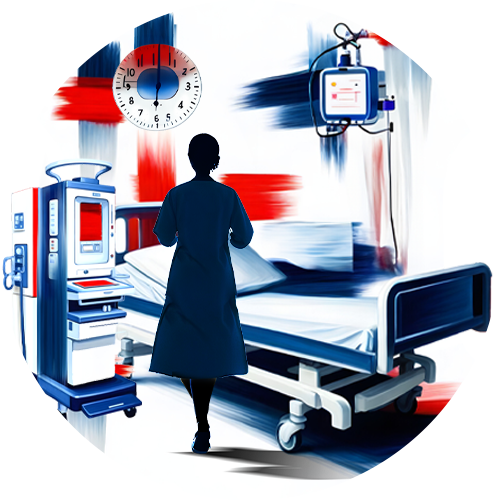On Call — Chapter 13: The Best I Can
| July 2, 2024In my line of work, childcare is not just essential, it’s the oxygen that keeps my day going

W
hen the babysitter’s name flashes on the screen of my phone, my heart sinks.
“Hello?”
“Sorry, Ayala, one of my kids had fever last night. I’m not going to be able to babysit today,” she says apologetically.
“Thanks for letting me know. Refuah sheleimah,” I say fervently. That child needs to get better, and I need a babysitter. In my line of work, childcare is not just essential, it’s the oxygen that keeps my day going. I have a babysitter, a backup babysitter, a backup-backup babysitter… and so on. Unfortunately, backup babysitter is not available, but backup-backup babysitter is. I have a ten-hour shift, and I need to be there by 6 a.m. It’s not an easy time, and I pay the price.
Yitzy gazes at me, all big blue eyes and delicious dimples, and for one moment I wish I could stay home, breathing in that sweet baby smell, snuggling that little body…. But I have to work. His babysitters are wonderful, caring women, but the guilt is ever-present. When he cries at night, is it only because he’s hungry, or because he feels abandoned? When I’m home, Yitzy is my complete focus, and I shower him with Mommy time, but sometimes I wonder. I know that life will be easier after my residency, that I’ll have normal hours and be able to be a normal mother, but looking at my child, I experience doubt.
When Yitzy is safely ensconced at the backup-backup’s home, I enter the world of the ER, where there’s no time to dwell on every Jewish woman’s favorite pastime (guilt).
My first patient is a heavyset 45-year-old man with thinning hair. The nurse has already put him on a cardiac monitor, and I quickly glance at his — John’s — chart.
“I’m Dr. Rubin,” I introduce myself. “According to your chart, you’ve been having abdominal pain. Where is it hurting?”
“Somewhere around here,” he says unhelpfully, pointing vaguely at his midsection.
“I see. When did the pain start?”
“Suddenly this morning.”
There’s been no vomiting, and when I palpate his abdomen, it’s soft and he doesn’t react.
“I’m a pretty heavy smoker,” John admits when we discuss his history. “And I get heartburn often, but I don’t usually take any medication, even when it gets bad.”
Maybe it’s a bad case of heartburn? John’s vitals look completely normal — blood pressure, pulse, temperature. I order some basic bloodwork to rule out any abnormalities, and then give him some Tylenol to relieve the pain, and Pepcid for the heartburn. By the time the blood results are back, John’s feeling much better.
Many patients don’t realize that in the ER, our resources are stretched extremely thin. One of my main jobs is figuring out who’s really sick and needs further testing. John doesn’t seem to fit the criteria, but I gave him the usual extensive follow-up instructions. It’s our way of protecting ourselves and our patients. We can miss things, but with clear-cut directions, patients know when they need to return.
“Your results are normal,” I say, handing him a sheaf of printouts. “But if you continue to feel pain, or if your pain worsens, don’t hesitate to come back to the ER.”
“Sure thing,” John replies, smiling. “Thanks!” Stuffing the papers into his pocket, he strolls out the door into the ER waiting room.
One hour later I’m about to see a teenager with a cut finger, when a twisted figure stumbles into the ER. It’s a man, face crumpled in agony, clutching his abdomen and groaning.
A sick feeling of disbelief. John.
His skin is stark white, and he can barely talk. I sense an emerging disaster, and the guilt burns as the attending rushes to intervene.
“He was here an hour ago with slight abdominal pain,” I babble. “Everything looked completely normal!”
We rush John into the first available room, where a nurse takes his vitals, and we grimace at the extremely low numbers. Another nurse quickly inserts an IV and starts fluid to raise his blood pressure.
“We need a bedside scan,” the attending tells me, and I quickly place the ultrasound probe over John’s abdomen. At first, everything looks normal — and then I see it. There, in the aorta, the largest artery coming from the heart down into the abdomen, is an abnormal, distended mass that looks oddly like a doughnut. The artery’s thinning walls have obviously ruptured, leaking blood into the retroperitoneal cavity. A Triple-A. Half of those suffering from an aortic abdominal aneurism die before they reach the hospital; 40 percent die in the hospital. The number of survivors is chillingly low, but I’m praying that John will be one of them.
“It’s time for MTP, Massive Transfusion Protocol,” I say steadily. John needs large amounts of blood to replace everything he’s losing through the rupture, and while I call the blood bank to send up blood plasma and platelets to stabilize him, the attending gets on the phone with the OR, asking them to send a surgeon down right away. An aortic abdominal aneurysm is a lengthy surgery, and John needs it immediately.
The attending keeps calling for a surgeon as I swiftly insert a cordis into John’s femoral vein for the massive transfusions he needs to stay alive. When the bags of blood arrive, the nurse hooks the lifegiving fluids to the IV. The surgeon arrives as John is being prepped for surgery, and I have to move on to my next patient, the boy with the cut finger who’s been waiting this entire time. I’m shaken, almost unable to focus on the finger. John might die because I missed this aneurysm. Could I have done anything differently?
I’m suturing the deep wound, but in my head, I’m going over John’s case, and the violent pounding of my heart slows. I know I followed the ER protocol, based on the information I had. I work with a snapshot of each patient for the brief time they’re here, and as long as I’m not careless or negligent, it’s sheer arrogance to feel that life and death is in my hands. I know Who’s really in charge, and it’s not me.
It’s always like that, I realize. Not just in the ER. I do the best I can for my husband, my child, and my home with the time and resources I’m given. I need to let go of the guilt because even though I’m not enough, He is.
Still, I track John on the hospital patient portal, and when he survives his surgery, I’m overwhelmed with thankfulness. It’s a gift, knowing that all I can do is the best I can.
The characters in this series are composites; all the stories are true.
(Originally featured in Family First, Issue 900)
Oops! We could not locate your form.


